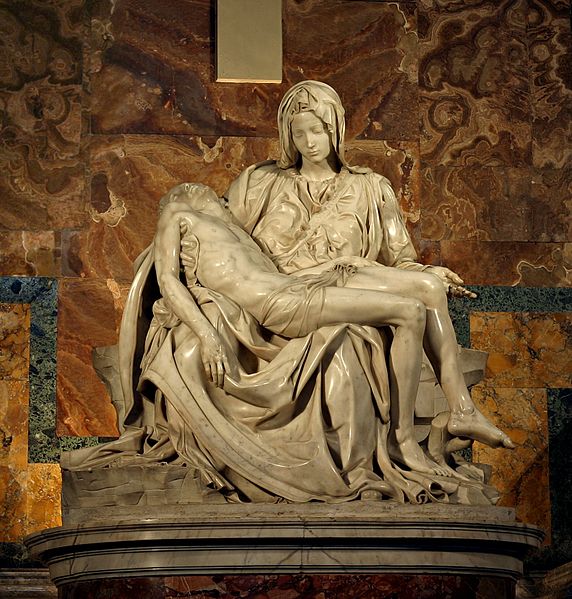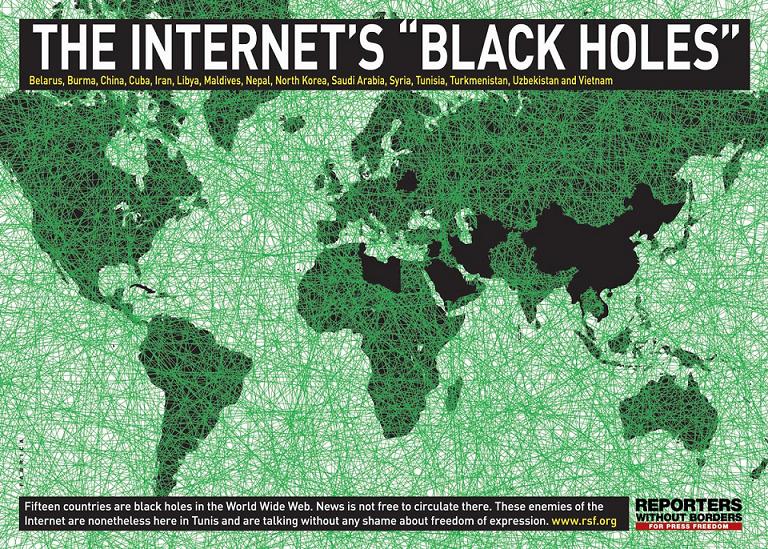
P.S. - Ron Paul é o único político que conheço a ter a foto de um anarquista pendurada na parede do seu escritório.
"In the universe there is never and nowhere stability and immobility. Change and transformation are essential features of life. Each state of affairs is transient; each age is an age of transition. In human life there is never calm and repose. Life is a process, not a perseverance in a status quo" -- Ludwig von Mises

The man credited with founding Wikipedia, Jimmy Wales — known to Wikipedians as "Jimbo" — was a finance major at Auburn University when the Mises Institute's Mark Thornton suggested he read "The Use of Knowledge in Society," a now-famous essay written by Austro-libertarian economist and Nobel laureate Friedrich von Hayek. The essay argues that prices in the market represent a spontaneous order that results from the interaction of individuals with diverse wants, allowing them to cooperate to achieve complex goals. According to a June 2007 Reason magazine interview, this insight of Hayek's is what led Wales to found Wikipedia. The rather lofty vision that inspired Wales? "Imagine a world in which every single person on the planet is given free access to the sum of all human knowledge. That's what we're doing."
While that ultimate goal imagined by Wales for Wikipedia has not yet come to fruition, there is no questioning the breadth and usefulness of Wikipedia. Those who refused to believe that a user-generated encyclopedia could compete with the monolithic, traditional encyclopedia written by experts and organized by professional editors, were no doubt shocked when Nature magazine published a 2006 article comparing Wikipedia to the well-known Encyclopedia Britannica. The article concluded that Wikipedia articles were comparable in accuracy and thoroughness to those of the older, paper encyclopedia.
 A Associated Press reporta que o senador do Nebraska acaba de processar Deus. É verdade, processar Deus. Não se poderá dizer que é estranho numa era de positivismo legal, mas não deixa de ser curioso. E é curioso apenas por uma razão. Este senador do Nebraska, Ernie Chambers, acusa Deus de ser responsável por milhões de mortos ao longo da história da humanidade e todo o género de desastres naturais, dado que terá permitido, através da sua passividade, que estes eventos ocorressem. A notícia não o aponta mas todo este raciocínio se baseia numa simples premissa: Deus tem poder ilimitado para intervir no mundo material - que Ele próprio terá criado - e o dever moral de o fazer, podendo ser visto como negligente em caso contrário. A concretizar-se este processo judicial, o réu dificilmente poderá escapar a ser apresentado em tribunal já que, para além de omnipotente (pode Deus criar uma pedra tão pesada que nem Ele mesmo a pode levantar?), é também omnipresente. E, tendo em conta, que no Nebraska - se não for julgado a nível federal - se pratica a pena de morte, o mais provável é que a ela seja condenado por, alegadamente, ter contribuído para a morte de milhões de ser humanos. Neste termos, Deus é, basicamente, um genocida da pior espécie. Este tipo de conclusões merece alguma consideração. Será que queremos realmente matar quem nos criou e que, pelo seu poder, mantém todo o Universo a funcionar, incluindo os sistemas legais humanos que o condenam? E se Ele é realmente omnipotente, de que vale condená-lo se Ele pode escapar e a pena é inaplicável, sendo apenas um mecanismo que provavelmente ateará a sua ira (relembro, de acordo com a teoria, o tipo é omnipotente e não tem grandes padrões morais)? Não sei porquê, mas não parece assim tão boa ideia.
A Associated Press reporta que o senador do Nebraska acaba de processar Deus. É verdade, processar Deus. Não se poderá dizer que é estranho numa era de positivismo legal, mas não deixa de ser curioso. E é curioso apenas por uma razão. Este senador do Nebraska, Ernie Chambers, acusa Deus de ser responsável por milhões de mortos ao longo da história da humanidade e todo o género de desastres naturais, dado que terá permitido, através da sua passividade, que estes eventos ocorressem. A notícia não o aponta mas todo este raciocínio se baseia numa simples premissa: Deus tem poder ilimitado para intervir no mundo material - que Ele próprio terá criado - e o dever moral de o fazer, podendo ser visto como negligente em caso contrário. A concretizar-se este processo judicial, o réu dificilmente poderá escapar a ser apresentado em tribunal já que, para além de omnipotente (pode Deus criar uma pedra tão pesada que nem Ele mesmo a pode levantar?), é também omnipresente. E, tendo em conta, que no Nebraska - se não for julgado a nível federal - se pratica a pena de morte, o mais provável é que a ela seja condenado por, alegadamente, ter contribuído para a morte de milhões de ser humanos. Neste termos, Deus é, basicamente, um genocida da pior espécie. Este tipo de conclusões merece alguma consideração. Será que queremos realmente matar quem nos criou e que, pelo seu poder, mantém todo o Universo a funcionar, incluindo os sistemas legais humanos que o condenam? E se Ele é realmente omnipotente, de que vale condená-lo se Ele pode escapar e a pena é inaplicável, sendo apenas um mecanismo que provavelmente ateará a sua ira (relembro, de acordo com a teoria, o tipo é omnipotente e não tem grandes padrões morais)? Não sei porquê, mas não parece assim tão boa ideia.Of all the modern economic theories, the economic system of Marxism is founded on moral principles, while capitalism is concerned only with gain and profitability. Marxism is concerned with the distribution of wealth on an equal basis and the equitable utilization of the means of production. It is also concerned with the fate of the working classes--that is, the majority--as well as with the fate of those who are underprivileged and in need, and Marxism cares about the victims of minority-imposed exploitation. For those reasons the system appeals to me, and it seems fair. I just recently read an article in a paper where His Holiness the Pope also pointed out some positive aspects of Marxism.
As for the failure of the Marxist regimes, first of all I do not consider the former USSR, or China, or even Vietnam, to have been true Marxist regimes, for they were far more concerned with their narrow national interests than with the Workers' International; this is why there were conflicts, for example, between China and the USSR, or between China and Vietnam. If those three regimes had truly been based upon Marxist principles, those conflicts would never have occurred.
I think the major flaw of the Marxist regimes is that they have placed too much emphasis on the need to destroy the ruling class, on class struggle, and this causes them to encourage hatred and to neglect compassion. Although their initial aim might have been to serve the cause of the majority, when they try to implement it all their energy is deflected into destructive activities. Once the revolution is over and the ruling class is destroyed, there is nor much left to offer the people; at this point the entire country is impoverished and unfortunately it is almost as if the initial aim were to become poor. I think that this is due to the lack of human solidarity and compassion. The principal disadvantage of such a regime is the insistence placed on hatred to the detriment of compassion.
The failure of the regime in the former Soviet Union was, for me, not the failure of Marxism but the failure of totalitarianism. For this reason I still think of myself as half-Marxist, half-Buddhist.
- Tenzin Gyatso, 14º Dalai Lama em Beyond Dogma: Dialogues and Discourses, 1996

This map was commissioned by Reporters Without Borders, which also publishes a World Ranking of press freedom. As the list of the 15 internet-restricting countries (followed by their ranking on said list) indicates, internet censorship is a strong indicator of press censorship in general:
1. Maldives (144)
2. Tunisia (148)
3. Belarus (151)
4. Libya (152)
5. Syria (153)
6. Vietnam (155)
7. Uzbekistan (158)
8. Nepal (159)
9. Saudi Arabia (161)
10. Iran (162)
11. China (163)
12. Myanmar/Burma (164)
13. Cuba (165)
14. Turkmenistan (167)
15. North Korea (168 and very last on the list)